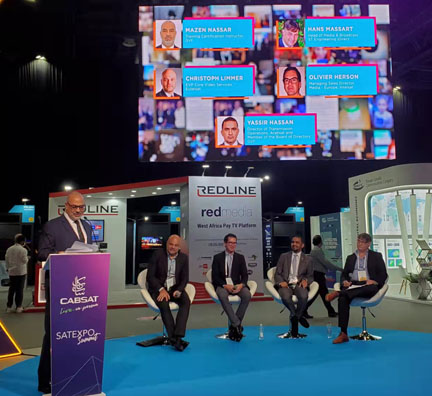From Satellite 2022 to CABSAT 2022
by Martin Jarrold
London, UK, April 1, 2022--In my previous column I introduced the new online educational program jointly developed by GVF, SatProf, Inc., and SSPI – the SBQ – achievement of which will confer the status of being Space Business Qualified. At SATELLITE 2022 the SBQ initiative was officially announced and formally launched.
GVF, through its training division – i.e., SatProf – has for 21 years been engaged in the provision of satellite earth station/terminal installer training and certification. In this year, GVF’s 25th, the addition of SBQ to our portfolio of training/education resources extends the association’s offering to include the satellite industry’s first comprehensive non-technical program and curriculum based on individual courses, full modules, and a dedicated certification path.
GVF, SatProf, and SSPI have an aggregate 80-years of experience in space industry education. In launching this new online learning program the three organizations will together satisfy the need of new and established businesses and employees in the commercial space industry to learn about all aspects of the business, enabling industry professionals to become space business qualified.
The space and satellite industry has grown far beyond the dreams of its commercial pioneers and the governments that started it, and is now a mature, fast-expanding, and complex business with an estimated value of well over US$1 trillion. It reaches deeply into dozens of vertical markets and other industry sectors, is essential in the provisioning of communications, data and the digital transformation of much of the global economy and has become an invisible but indispensable part of everyday economic activity. Its current accelerated growth is fueled by the financial community’s involvement, manifest in massive numbers of startups and new business models forming within it. Until SBQ there has been no industry course offering a comprehensive learning experience to explore this. SBQ’s non-technical education is designed to improve the knowledge and performance of existing employees, increase the marketability of those seeking a job in the industry, and provide employers with an inexpensive way to both increase productivity and enhance employee retention in a hyper-competitive labour market.
A Free “Welcome to the Business of Space” course is offered as an incentive for individuals and companies to examine the courses being offered, and a full description of SBQ courses can be found at www.SpaceBQ.org. Alternatively, email info@SpaceBQ.org for information, and stay informed by joining the growing community on LinkedIn and Twitter and following #SpaceBQ.
 After more than two years grounded from international travel I will shortly be resuming my travels to satellite industry events. First on my agenda is an event which, although it takes place in Dubai in the UAE, additionally addresses the markets of northern Africa and south Asia. At CABSAT 2022 GVF, an event Supporting Association, will be present three Summit panel discussion sessions over 17 & 18 May:
After more than two years grounded from international travel I will shortly be resuming my travels to satellite industry events. First on my agenda is an event which, although it takes place in Dubai in the UAE, additionally addresses the markets of northern Africa and south Asia. At CABSAT 2022 GVF, an event Supporting Association, will be present three Summit panel discussion sessions over 17 & 18 May:
•Stakes and Solutions in Responsibly Managing Space
Sustainability is a global priority across all industries and organizations, and should extend beyond our planet too. This panel will address multiple facets of sustainability with discussion points covering why we should care about our impact on space, whose responsibility it is to keep space clean, the risks of not responsibly managing our impact, and the tracking of orbital objects, including other solutions and best practices, to help us responsibly manage our use of space.
•Disruptive Evolution in the Satellite Ground Segment
Satellite’s ground segment, antennas in particular, is undergoing game-changing innovation. With the rapid growth of satellite networks in non-geostationary satellite orbits (NGSOs), and applications including machine-to-machine and people communications this part of the satellite industry is evolving to deliver, this panel will address developments in the use of metamaterials, in power efficiency and in interference prevention, examine how satellite will reach full potential in delivering services across business, government, and consumer, together with discussing the benefits and challenges to adoption of flat panel alternatives to traditional parabolic antennas.
•‘Driving a New Space Innovation Paradigm with Artificial Intelligence and Machine Learning’
AI and ML are being increasingly applied to foster innovation in the satellite and wider space industries. Impacting multiple areas of space operations, this panel will explore how the satellite industry is leveraging AI and ML to revolutionize business. This panel will touch upon areas including optimization in satellite autonomous control, in-orbit servicing/refueling, and spacecraft decommissioning, data-gathering, analytics and management, and advances in software-defined networks and the design of new satellite terminals.
GVF’s webinar series – in partnership with Connectivity Business News (CBN) – continues. Just concluded at time of writing is the webinar entitled ‘Satellites and Mobile Communications’, featuring a panel comprising Will Mudge, VP Engineering Operations, Speedcast; Henning Pottharst, Head, Smart Solutions, Tracking & Innovation, Hellmann Worldwide Logistics; Marco Camporeale, Head of Maritime Digital, Inmarsat; and Dr Shay Har-Noy, General Manager, Aviation, Spire. Moderated by Alex Goldman, Editor of Connectivity Business News, the focus was on the imperatives of establishing, maintaining, and expanding communications connectivity with all the modes of transportation which move our raw materials and manufactured goods around the world. Communications on the Move is a “have to have” in the business of global logistics.
Discussion covered the importance of data in helping customers achieve their goals and addressed such questions as to how COVID-19 has changed the business of the data/logistics interface, and the accelerating pace of digitalisation, violations of data norms, analysing the nature of the “logistics void”, and the challenges of tracking cargoes, as opposed to tracking vehicles. The webinar recording is available at https://gvf.org/webinar/satellites-and-mobile-communications/.
Thursday, 28 April brings the next in the series, ‘New Technologies, New Services’. Innovations in the space segment, such as High Throughput Satellites, Very High Throughput Satellites, High Altitude Platform Systems, software defined satellites and satellites utilizing inter-satellite links, have been receiving a lot of attention as billions are invested in satellites with these new technologies. In order to receive the return on investment in these new technologies, customers in government, enterprise and consumer segments must see corresponding benefits in the services derived from these technologies. The panel will explore the new services enabled by the innovations in the space segment and how they will increase the value proposition of satellite communications.
Register for this event at: https://gvf.org/webinar/new-technologies-new-services/
-------------------------------------
 Martin Jarrold is Vice-President of International Program Development of GVF. He can be reached at: martin.jarold@gvf.org
Martin Jarrold is Vice-President of International Program Development of GVF. He can be reached at: martin.jarold@gvf.org






